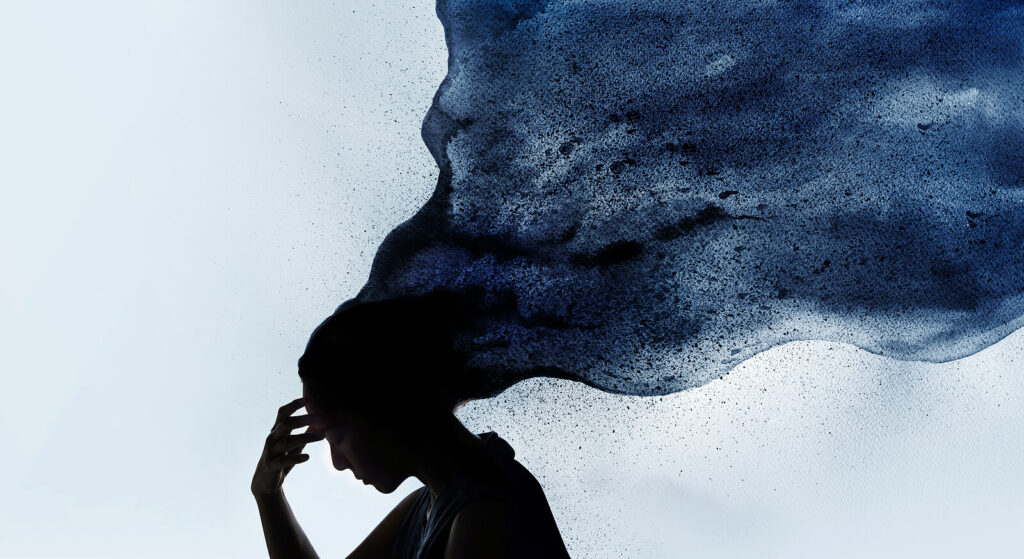Although the current diagnostic criteria for ADHD make no mention of emotion or mood regulation problems, most people with ADHD will admit to having issues with emotional instability. In fact, ADHD specialist Dr. William Dodson reports that over 30 percent of adolescents and adults with ADHD view their difficulty regulating emotions to be the most impairing aspect of their diagnosis. One particularly harmful form of emotional dysregulation in ADHD is called Rejection Sensitive Dysphoria (RSD). It makes receiving rejection or criticism disproportionately painful to experience.

Despite its prevalence, RSD is often ignored in discussions about ADHD symptomology. Early research on ADHD largely overlooked RSD because it is not a consistent symptom of ADHD (instead occurring in brief episodes), it was difficult to objectively measure in studies, and it was frequently underreported. People with ADHD tend to hide their emotional reactions to rejection out of embarrassment or shame.
As such, it is important that individuals with ADHD learn what rejection sensitivity means, how it manifests in daily life, and how to cope with it in healthy ways.
What Is Rejection Sensitive Dysphoria?
RSD is an extreme emotional sensitivity or pain triggered by the perception that one has: been rejected, teased or criticized; disappointed important people in their lives; or failed to attain their own standards or goals. Some examples of events that might trigger RSD include getting into an argument with a friend, receiving negative feedback from your boss, or being “ghosted” after a first date.
Most people would agree that facing rejection, criticism, or failure isn’t fun. The difference for people with RSD is that when these universal life experiences occur (or have the potential to occur), the emotional pain that follows is overwhelmingly intense and highly impairing. ADHD patients have likened this feeling to having an open wound. Some report that the pain is so catastrophic and terrible that it cannot adequately be put into words. Indeed, the word “dysphoria,” which is Greek for “unbearable,” appears to be an apt term to describe the experience of RSD.
Additionally, negative events don’t actually need to occur for an intense emotional response to ensue.
Individuals with RSD will often over-perceive and invent possible threatening scenarios in many aspects of their lives. Then they will behave as if the threat genuinely exists. In the case of a first date, for instance, someone with RSD might convince themselves that their date will eventually stop responding to their messages. Consequently, they might decide to cancel at the last minute in order to avoid possibly feeling even more hurt later on. For someone with RSD, the mere idea of potential rejection is enough to evoke deeply unpleasant emotions that can deter them from taking risks. So although the threat of rejection and failure can be either true or imagined in people with RSD, the emotional agony that results feels gut-wrenchingly real.
What Does Rejection Sensitive Dysphoria Look Like?
How an individual reacts to rejection depends on their tendency to either internalize or externalize threatening situations. Someone prone to internalizing will direct their emotional reactions inward toward themselves. In the case of RSD, this can look like episodes of extreme sadness and feelings of worthlessness that mimic the symptoms of depression. In severe cases, some individuals will also experience suicidal thinking during these episodes. On the other hand, individuals prone to externalization turn their emotions outward onto the world. In RSD, this often manifests as tremendous rage directed at the person or situation that wounded you so deeply. It shouldn’t be surprising then that one study found 50 percent of people in court-mandated anger management have previously undiagnosed ADHD.

While individuals with RSD might have differing response styles to rejection, both types of emotional responses tend to emerge and dissipate very suddenly. Someone might go from acting normally to exploding with anger to then an hour later appearing completely unfazed. These rapid changes in mood can occur multiple times in a single day. As such, psychiatrists often misdiagnose RSD as “rapid cycling” bipolar disorder or borderline personality disorder because of the erratic nature of patients’ emotions. It can take a long time for clinicians to recognize that these symptoms are actually associated with ADHD and rejection sensitivity specifically.
How is Rejection Sensitive Dysphoria Impacting Your Life?
People with ADHD commonly use two ways to cope with the emotional burden of RSD, and the two are not mutually exclusive.
The first is becoming a “people pleaser.” Individuals with RSD often analyze each person they meet in order to pick out what exactly that person would admire and praise. They become excellent at determining what people look for in relationships and subsequently try to embody that perfect image. The unconscious hope is that by keeping everyone in their lives happy, they will never have to experience the pain of letting someone down. Unfortunately, this coping mechanism often leads people with RSD take on a false sense of self and lose track of their personal goals and desires. It can also result in built-up resentment towards others because one’s own needs are not being prioritized.
The second most common way people with RSD protect themselves from the potential pain of failure is by refusing to try in the first place. People that employ this coping strategy will decide not to take risks or try something new if there is even the slightest possibility of failing. Or, falling short of their own expectations. The logic is sound: it’s impossible to lose if you never play the game. However, engaging in this kind of avoidance greatly hinders one’s ability to reach their fullest potential and achieve the most out of their life.
Managing Rejection Sensitivity: Better Ways to Cope
Although RSD often leads individuals to adopt coping strategies that are detrimental, people with ADHD are more than capable of creating new patterns of thinking and behaving in response to rejection. Below are some suggestions and tips for managing the effects of rejection on your ADHD brain.
1. Identify your strengths and externalize them.
When you experience RSD, your senses are overloaded. Your emotional brain, which is notoriously poor at using logic and reason, takes over. Once the emotional brain has control, it’s very easy to lose sight of your good qualities. Instead, you ruminate on the potential bad. To combat this, it’s important to focus on identifying your strengths – what you do well, what makes you great, and what you like about yourself. Then write them down! By keeping a list of all the things that make you exceptional, you give the emotional brain less power when rejection or failure does occur. This way it’s harder to get lost in the negative.
2. Challenge your negative thoughts.
Another way to reduce the power of your emotional response is by giving your thoughts less control. Our thoughts are like fuel to fire for our feelings and behaviors, so learning to stop a negative thought in its tracks can be extremely effective at changing our reaction to a situation. To do this, try challenging the negative or irrational thoughts that arise when you experience rejection. Some helpful questions to ask yourself include: Is there substantial evidence for my thought?; Is there evidence that is contrary to my thought?; What is another way this situation could be interpreted from an outside observer?; What would a friend think about the situation? Asking these questions can expand your perspective and help you consider things more objectively.
3. Use the STAR method (Stop, Think, Act, Recover).
When rejection does occur, it’s important to have a strategy in mind that helps put the rational brain (instead of the emotional brain) in the driver’s seat. To begin harnessing control over your executive functioning, you need to first remember to stop and take a pause before reacting. In that pause, think about the situation from various perspectives. This is also a good time to try a thought challenge exercise like the one mentioned above. After you have considered the situation from all sides, then you can act in a way that you deem appropriate. Use the recovery stage to reflect on the events that transpired and determine how this might affect your response next time.
4. Try mindfulness techniques.

Mindfulness is a form of meditation in which you learn to become attuned to what you’re sensing and feeling in the moment without interpretation or judgment. It helps you sit with your feelings, acknowledge them, and name them. In doing so, you allow yourself the space to calmly and thoughtfully respond. In the context of RSD, mindfulness can be an extremely useful tool to help lessen the intensity of emotional responses following rejection. By practicing mindfulness, individuals can learn to both respect their initial emotional reactions to some external criticism, while also responding to the criticism in a rational manner.
In Conclusion
Experiencing rejection and criticism are inevitable aspects of life. However, people with ADHD feel the effects of rejection much more intensely than a neurotypical person does. This sensitivity to rejection can cause individuals to go to incredible lengths to avoid the possibility of getting hurt. The unfortunate result is that people with RSD end up not taking risks or pursuing their aspirations out of fear that it won’t go perfectly. Luckily, better-coping mechanisms exist to help individuals reduce both their perceptions of rejection and their reactions when it does actually occur.
Begin Working With An ADHD Therapist in New York, NY
While rejection may be a part of everyone’s life, you don’t have to struggle with the stress the effects can bring. Our team is happy to offer support in NYC and across the state. Our expert ADHD-Focused therapists can help you cope with criticism in a more healthy way. To start your therapy journey with our New York, NY-based practice, please follow these steps:
- Contact the team at ATTN Center
- Learn more about our team and the services offered here!
- Start managing rejection and criticism in a healthier way!
Other Services Offered With The ATTN Center in New York, NY
Our team knows that you may experience more than one mental health concern as a result of ADHD symptoms. This is why we are happy to also offer ADHD-focused therapy for anxiety, depression, and couples. We also provide services including neurofeedback, group therapy, and ADHD testing options. At ATTN Center of NYC, we do everything in our power to treat ADHD without the use of medication, but we understand in some severe cases additional measures may be needed. As a result, we also maintain close relationships with many of NYC’s best psychiatrists. Feel free to visit our articles page for more helpful information today!